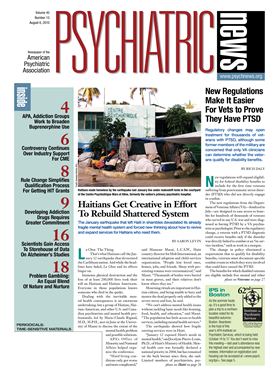New regulations will expand eligibility for federal disability benefits to include for the first time veterans suffering from posttraumatic stress disorder (PTSD) who did not directly engage in combat.
The new regulations from the Department of Veterans Affairs (VA)—finalized in July—are designed to ease access to benefits for hundreds of thousands of veterans who served in any U.S. war and were diagnosed as having PTSD by a VA psychiatrist or psychologist. Prior to the regulatory change, a veteran with a PTSD diagnosis could receive benefits only if the disorder was directly linked to combat or an “in-service incident,” such as work in a morgue.
The change in policy eliminated a requirement that to qualify for disability benefits, veterans must document specific combat events in which they were involved that could have caused the PTSD.
The benefits for which disabled veterans are eligible include free mental and other health care and monthly cash payments based on the severity of the condition.
The regulatory changes were hailed by veterans' advocates and psychiatrists as an acknowledgement that PTSD can result from the stress of living in a combat zone for long periods, where an attack could come at any time.
“The Department of Veterans Affairs is making a major contribution to the mental health of our men and women in uniform by streamlining the process for service members to receive treatment for posttraumatic stress disorder and traumatic brain injury,” wrote APA President Carol Bernstein, in a July 15 letter in USA Today. “Exposure to a series of events that create intense fear, helplessness, or horror can trigger the condition, and delayed onset of symptoms can make it even more difficult to pinpoint a single cause.”
“This will be a very positive change because some veterans have had difficulty documenting their trauma,” agreed John Renner, M.D., associate chief of psychiatry for the VA Boston Healthcare System, in an interview with Psychiatric News.
The new regulations may particularly benefit veterans who endured secondary trauma, Renner said, such as supply-truck drivers who faced the daily fear of explosions or direct attacks but were never assaulted.
The change could impact a substantial number of veterans. A 2008 Rand Corporation report estimated that 14 percent of veterans who return from Iraq and Afghanistan suffer from PTSD, but that more than half of service members affected by PTSD or other mental illnesses do not seek or receive the care they need.
Veterans' groups hailed the regulatory changes that they have urged for years after even combat veterans complained that locating the required military records was extremely time consuming and sometimes impossible. The previous requirements also were seen as discriminatory against veterans from the wars in Afghanistan and Iraq, where many—including women—did not serve in combat roles but still endured traumatic experiences. The new regulations state that a stressor leading to a PTSD diagnosis must be related to a “fear of hostile military or terrorist activity ... [and] consistent with the places, types, and circumstances of the veteran's service.” This wording reflects the way in which wars have changed since Vietnam, with terrorism and guerilla tactics becoming common, and a clear front line of combat rarely identifiable.
In a written statement, Paul Riekoff, executive director of the Iraq and Afghanistan Veterans of America, called the regulatory changes a “step in the right direction” that “removes a key bureaucratic obstacle to care and will go a long way toward helping men and women coming home from Iraq and Afghanistan with invisible wounds.”
The changes drew concerns, however, over the estimated $5 billion cost, and some critics of the broadened policy warned that a flood of fraudulent claims will result. But supporters of the regulatory changes maintained that the VA will continue to review all claims and eliminate the baseless ones.
The new regulations did draw reservations from some veterans' advocates, though, over a requirement that a VA psychiatrist or psychologist “confirms that the claimed stressor is adequate to support a PTSD diagnosis,” according to the VA's Web site. The advocates worried that the provision will allow the VA to sharply limit approvals. Additionally, they point out that many veterans seek care from private physicians, whose diagnosis alone should qualify them for benefits. VA officials said, however, that only VA-employed clinicians were trained to establish a “service-related” connection between the illness and war-zone experiences.
Officials at the VA also maintained that its nearly 20,000 psychiatrists and mental health professionals and more than 100 PTSD treatment centers should be able to handle increased demand.
At least part of the impetus for the regulatory changes stemmed from congressional pressure. Rep. John Hall (D-N.Y.), chair of the House Veterans' Affairs Subcommittee on Disability Assistance and Memorial Affairs, introduced a bill (HR 952) in 2009 to institute a similar change.
“In today's modern conflicts, everyone serves on the front lines,” said Hall in a statement issued after the regulations were announced. The new policy “simplifies the process and allows VA employees to focus their efforts on new cases and to serve more of our veterans.”
